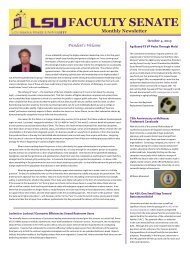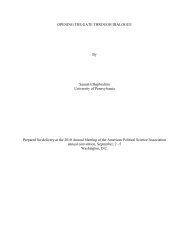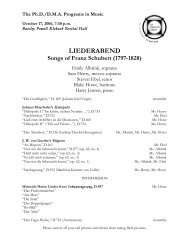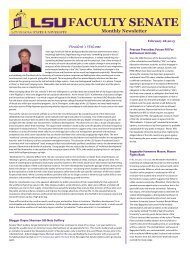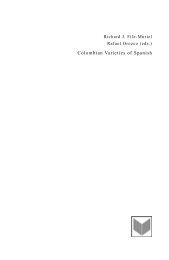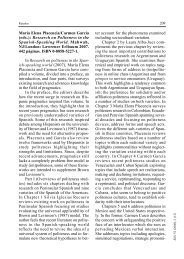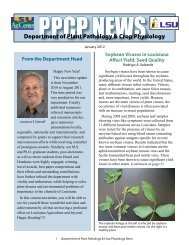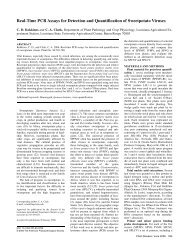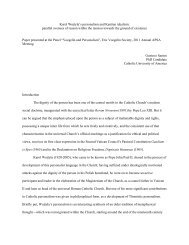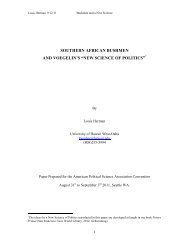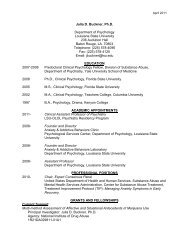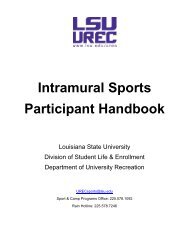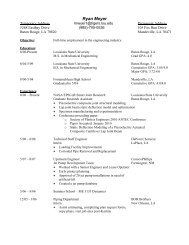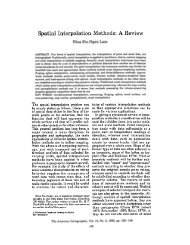Nicoletta Stradaioli, University of Perugia - Louisiana State University
Nicoletta Stradaioli, University of Perugia - Louisiana State University
Nicoletta Stradaioli, University of Perugia - Louisiana State University
You also want an ePaper? Increase the reach of your titles
YUMPU automatically turns print PDFs into web optimized ePapers that Google loves.
literature constitutes reality, if it is any good, and does not merely imitate or interpreted it. The<br />
starting point for theoretical consideration would be for me the Aristotelian observation (in the<br />
Poetics) that the poets give better insights into human nature than the historians, because they do<br />
not report reality but imaginatively create the “nature” <strong>of</strong> things. “Reality” as observed is always<br />
nature in the state <strong>of</strong> potentiality; the “true” reality <strong>of</strong> actualized nature is rarely given, but must be<br />
constructed from the resources <strong>of</strong> the artist. 35<br />
Thus, literature is a way for starting an inquiry into the nature <strong>of</strong> man. This type <strong>of</strong><br />
investigation does not exclude history. On the contrary it is a historical interpretation<br />
because the nature <strong>of</strong> man unfolds its potentialities historically and it reveals the mutual<br />
participation in the quest <strong>of</strong> human nature between the object <strong>of</strong> interpretation or rather the<br />
human being (the novelist/the poet who symbolized their experiences in language) and the<br />
subject <strong>of</strong> interpretation (the philosopher or the literary critic). The shared spiritual<br />
substance <strong>of</strong>, on the one hand, the writer and, on the other hand, the philosopher/literary<br />
critic makes possible participation «in the great dialogue that goes through the centuries<br />
among men about their nature and destiny». 36 Thus, in literary works emerge the symbolism<br />
<strong>of</strong> the search for order in the human existence <strong>of</strong> artists. And the works <strong>of</strong> art enable us to<br />
understand the one ordered universe common to all, to develop and fulfill our potential as<br />
human beings and to understand the dimensions <strong>of</strong> reality in which we find ourselves<br />
immersed. 37 This literary exploration into being has two constituents. First <strong>of</strong> all, it consists<br />
<strong>of</strong> a common sense approach (a «pre-philosophic “wisdom” literature») 38 which clings to<br />
reality and reveals the immediacy <strong>of</strong> the language symbolism <strong>of</strong> the artist. 39 In addition to<br />
that, it also involves a critical-questioning approach or rather a philosophical inquiry to<br />
reach the heart <strong>of</strong> human existence. This kind <strong>of</strong> analysis is the one carried on by<br />
philosophers (and literary critics) to fully grasp human experience as it has been articulated<br />
and symbolized. Both components (common sense and critical-philosophical approach) are<br />
35<br />
Voegelin to Heilman, January 14, 1961, in C.R. EMBRY (ed. by), Robert B. Heilman and Eric Voegelin. A<br />
Friendship in Letters 1944-1984, Columbia and London, <strong>University</strong> <strong>of</strong> Missouri Press, 2004, p. 210.<br />
36<br />
Voegelin to Heilman, August 22, 1956, in C.R. EMBRY (ed. by), Robert B. Heilman and Eric Voegelin. A<br />
Friendship in Letters 1944-1984 cit., p. 157. Cfr, C.R. EMBRY, The Philosopher and The Storyteller. Eric<br />
Voegelin and the Twentieth-Century Literature cit., p. 20.<br />
37<br />
C.R. EMBRY, The Philosopher and The Storyteller. Eric Voegelin and the Twentieth-Century Literature<br />
cit., pp. 5-6.<br />
38<br />
Voegelin to Heilman, December 30, 1969, in C.R. EMBRY (ed. by), Robert B. Heilman and Eric Voegelin.<br />
A Friendship in Letters 1944-1984 cit., p. 259.<br />
39<br />
From the philosopher or literary critic’s view that means a historical study which gives precedence to the<br />
texts and to the experiences <strong>of</strong> reality that texts symbolize.<br />
16



